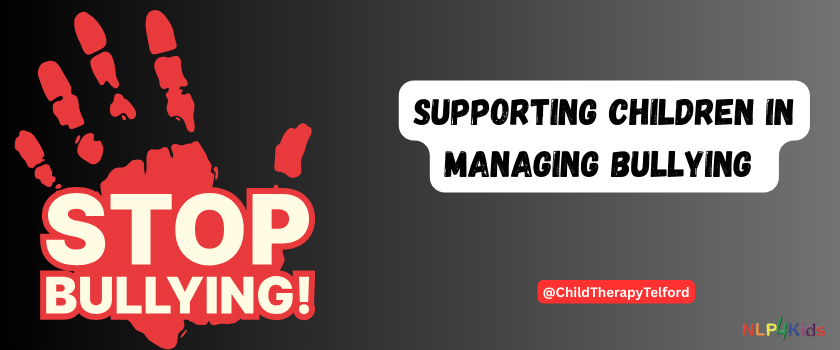Supporting Children in Managing Bullying

In today’s world, addressing the emotional well-being of children is more crucial than ever. As a child therapist at Child Therapy Telford, I utilise Neuro-Linguistic Programming (NLP) to help children cope with anxiety and develop essential life skills. The below highlights the significance of empowering children to handle conflicts in their friendships, fostering resilience and effective communication. By equipping them with the right tools, we can help them navigate their emotional landscapes and promote healthier interactions.
The Emotional Burden on Children
Understanding emotional challenges can be overwhelming for anyone, particularly children. When faced with multiple stressors, it can be difficult for them to focus on their tasks and responsibilities. Anxiety can manifest in various forms, making it hard for children to engage fully in their educational and social environments.
Recent statistics indicate that approximately 1 in 5 children in the UK experience bullying, significantly affecting their mental health and academic performance (Department for Education, 2023).
These figures underscore the urgent need for effective support systems that can address not only the symptoms of anxiety but also the underlying issues related to social interactions.
Teaching Children to Manage Conflicts
During a recent visit to a school, one NLP4Kids practitioner observed that while many children displayed confidence, they struggled with resilience, particularly when faced with conflicts. For instance, when arguments erupted between friends, children often became fixated on the negative exchanges instead of seeking resolutions.
They would typically turn to teachers or parents for assistance, which often led to misunderstandings and further complications. In many cases, teachers found themselves overwhelmed by the details of who said what, and parents sometimes escalated the issue, fearing that their child was being bullied. Unfortunately, neither approach provided the children with the necessary resources to resolve their conflicts independently.
A Montessori teacher known to a practitioner now adopts a proactive stance by asking her students, “Are you bringing me a problem or a solution?” This approach encourages children to think creatively and consider solutions rather than merely reporting grievances. By prompting them to devise their own resolutions, children feel more empowered and develop essential problem-solving skills that will serve them well in the future. (This strategy is also known in the workplace; I used to have a boss before I even opened my mouth, based on my body language, would say ‘have you a problem or a problem with a solution. I caught on very quickly to only go and speak about an issue with at least some kind of narrative on how to solve it).
The Benefits of Empowerment and Ownership
Encouraging children to take ownership of their conflicts has several advantages. It fosters a culture where they feel responsible for their actions and the outcomes of their interactions. This shift in mindset not only reduces the number of complaints directed at teachers but also encourages children to rely less on adults to resolve their issues.
By equipping children with the tools to handle their anxiety and interpersonal challenges, we help them build resilience. When children feel supported in managing their emotions, they are less likely to become overwhelmed, enabling them to engage more positively with their peers.
At Child Therapy Telford – NLP4Kids, I focus on providing children with strategies that promote self-reflection and critical thinking. By engaging in activities that encourage them to consider how they would react in various situations, children learn to prepare for challenges independently. This proactive approach empowers them to face their fears and anxieties head-on.
Communication Skills
Effective communication is a vital component of resolving conflicts. Children who learn to articulate their feelings and thoughts are better equipped to foster healthy relationships. By encouraging open dialogue, we create an environment where children can express themselves without fear of judgement. Moreover, teaching children to communicate effectively can significantly reduce instances of bullying. According to the Anti-Bullying Alliance (2024) https://anti-bullyingalliance.org.uk/, schools that implement social and emotional learning programmes see a decrease in bullying behaviour by up to 30%. These programmes often focus on developing empathy and understanding, helping children to recognise the impact of their words and actions on others.
Preparing for Future Challenges
The skills children develop in managing their anxiety and resolving conflicts will benefit them throughout their lives. By learning to approach problems with a solution-focused mindset, they become more resilient and adaptable. This ability to cope with challenges can lead to improved academic performance, healthier social interactions, and enhanced emotional well-being.
As children gain confidence in their ability to manage conflicts, they are also likely to experience reduced levels of anxiety. This creates a positive feedback loop where improved emotional health leads to better academic outcomes, further reinforcing the importance of effective support systems.
Supporting children in managing their emotional challenges is essential for their development and well-being. By fostering a culture of responsibility and encouraging problem-solving skills, we empower children to take control of their interactions and emotions. As we continue to promote effective communication and emotional support, we can create a generation of children who are not only academically successful but also socially responsible and emotionally intelligent.
For more information on how NLP4Kids can help and support young people with communication skills, visit Child Therapy Telford. https://childtherapytelford.nlp4kids.org
Book a FREE 
https://louisa-nlp4kids.youcanbook.me
https://childtherapytelford.nlp4kids.org

The original version of this article was written by Gemma Bailey, director of www.NLP4Kids.org. It was republished and rebuilt with additional content by Louisa Gauld-Crichton – Child Therapy Telford. https://childtherapytelford.nlp4kids.org
Leave a comment
This site uses Akismet to reduce spam. Learn how your comment data is processed.


Leave a Reply